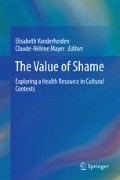Abstract
Shame can be a powerful and evocative experience. It can contribute to the development of mental illnesses, such as depressive, anxiety, and eating disorders. Shame can also contribute to social problems, such as violent crime. However, shame is experienced by almost everyone, and not everyone experiences such long-lasting negative effects. This chapter explores responses to shame, with an emphasis on resilience. We address the key question of why and how some people are devastated by shame, while others become resilient in the face of shame. Our research was conducted in New Zealand, and the findings represent the experiences of a selection of Pākehā New Zealanders.
Access this chapter
Tax calculation will be finalised at checkout
Purchases are for personal use only
References
Ahmed, E. (2001). Shame management through reintegration. Cambridge, United Kingdom: Cambridge University Press.
Beck, J., McNiff, J., Clapp, J., Olsen, S., Avery, M., & Hagewood, J. (2011). Exploring negative emotion in women experiencing intimate partner violence: Shame, guilt, and PTSD. Behaviour Therapy, 42, 740–750.
Bonanno, G. (2004). Loss, trauma, and human resilience: Have we underestimated the human capacity to thrive after extremely aversive events? American Psychologist, 59, 20–28.
Brown, B. (2006). Shame resilience theory: A grounded theory study on women and shame. Families in Society: The Journal of Contemporary Social Services, 87(1), 43–52. doi:10.1606/1044-3894.3483
Brown, B. (2010, June). Brené Brown: The power of vulnerability [Video file]. Accessed from http://www.ted.com/talks/Brené_brown_on_vulnerability.html
Deonna, J., & Teroni, F. (2008). Shame’s guilt disproved. Critical Quarterly, 50(4), 65–72.
Elison, J. (2005). Shame and guilt: A hundred years of apples and oranges. New Ideas in Psychology, 23(1), 5–32. doi:10.1016/j.newideapsych.2005.07.001
Fergus, T., Valentiner, D., McGrath, P., & Jencius, S. (2010). Shame- and guilt-proneness: Relationships with anxiety disorder symptoms in a clinical sample. Journal of Anxiety Disorders, 24(8), 811–815. doi:10.1016/j.janxdis.2010.06.002
Gilbert, P., McEwan, K., Irons, C., Bhundia, R., Christie, R., Broomhead, C., et al. (2010). Self-harm in a mixed clinical population: The roles of self-criticism, shame, and social rank. British Journal of Clinical Psychology, 49, 563–576.
Jain, S., Buka, S., Subramanian, S., & Molnar, B. (2012). Protective factors for youth exposed to violence: Role of developmental assets in building emotional resilience. Youth Violence and Juvenile Justice, 10(1), 107–129. doi:10.1177/1541204011424735
Masten, A. (2001). Ordinary magic: Resilience processes in development. American Psychologist, 56(3), 227–238. doi:10.1037/0003-066x.56.3.227
Montpetit, M., Bergeman, C., Deboeck, P., Tiberio, S., & Boker, S. (2010). Resilience-as-process: Negative affect, stress, and coupled dynamical systems. Psychology and Aging, 25, 631–640.
Persons, E., Kershaw, T., Sikkema, K., & Hansen, N. (2010). The impact of shame on health-related quality of life among HIV-positive adults with a history of childhood sexual abuse. AIDS Patient Care and STDs, 24(9), 571–580. doi:10.1089/apc.2009.0209
Peters, R. D., Leadbeater, B., & McMahon, R. J. (Eds.). (2005). Resilience in children families and communities: Linking context to practice and policy. New York, NY: Kluwer Academic/Plenum Publishers.
Roisman, G. (2005). Conceptual clarifications in the study of resilience. American Psychologist, 60, 264–265.
Scheff, T. J. (2003). Shame in self and society. Symbolic Interaction, 26, 239–262.
Sedgwick, E. K., & Frank, A. (Eds.) (1995). Shame and its sisters: A Silvan Tomkins reader. London, England: Duke University Press.
Sweezy, M. (2011). The teenager’s confession: Regulating shame in internal family systems therapy. American Journal of Psychotherapy, 65, 179–188.
Unikel, C., Von Holle, A., Bulik, C., & Ocampo, R. (2012). Disordered eating and suicidal intent: The role of thin ideal internalisation, shame and family criticism. European Eating Disorders Review, 20(1), 39–48. doi:10.1002/erv.1070
Vliet, K. (2009). The role of attributions in the process of overcoming shame: A qualitative analysis. Psychology and Psychotherapy: Theory, Research and Practice, 82(2), 137–152. doi:10.1348/147608308x389391
Author information
Authors and Affiliations
Corresponding author
Editor information
Editors and Affiliations
Rights and permissions
Copyright information
© 2017 Springer International Publishing AG
About this chapter
Cite this chapter
Brennan, S., Robertson, N., Curtis, C. (2017). Shame and Resilience: A New Zealand Based Exploration of Resilient Responses to Shame. In: Vanderheiden, E., Mayer, CH. (eds) The Value of Shame. Springer, Cham. https://doi.org/10.1007/978-3-319-53100-7_9
Download citation
DOI: https://doi.org/10.1007/978-3-319-53100-7_9
Published:
Publisher Name: Springer, Cham
Print ISBN: 978-3-319-53099-4
Online ISBN: 978-3-319-53100-7
eBook Packages: Behavioral Science and PsychologyBehavioral Science and Psychology (R0)

